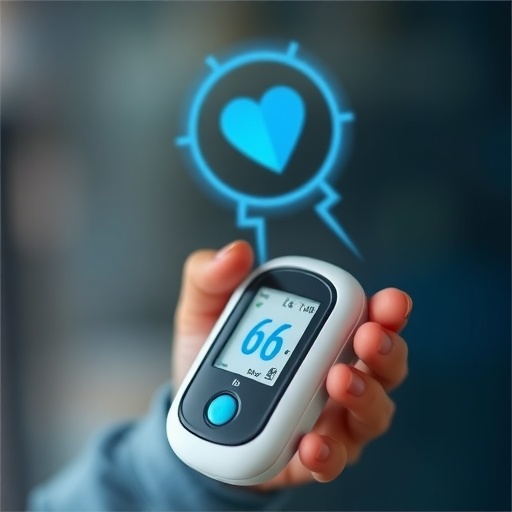In a groundbreaking position paper, a group of leading experts in diabetes management has outlined the profound potential of Continuous Glucose Monitoring (CGM) systems in advancing the treatment of Type 2 diabetes. This comprehensive assessment delves into the multifaceted role that CGMs can play, not only in glucose management but also in enhancing overall patient outcomes. The document consolidates research findings from various disciplines, highlighting the collaborative effort to tackle one of the most pressing healthcare challenges of our time.
As the prevalence of Type 2 diabetes continues to rise globally, innovative solutions are urgently needed. Traditional glucose monitoring techniques, which often require manual testing and may not capture the full complexity of blood sugar fluctuations, are increasingly viewed as inadequate. Continuous Glucose Monitoring systems, by contrast, provide real-time data collection, offering patients and healthcare providers a detailed overview of glucose levels, thus allowing for more personalized and effective management strategies.
CGMs work by utilizing a small sensor placed under the skin to measure glucose levels in interstitial fluid. This technology allows for continuous data readings, each capturing fluctuations in blood sugar levels throughout the day and night. By providing these insights, CGMs afford individuals living with diabetes the ability to understand their body’s responses to food, exercise, and stress in ways that traditional methods simply cannot.
One of the most remarkable features of CGM technology is its ability to alert users to hypo- and hyperglycemic events in real-time. For many patients, recognizing these fluctuations early can be life-saving. The technology can alert users when their blood sugar levels are dropping too low or rising too high, prompting timely interventions. This proactive approach to diabetes management is a game-changer, particularly for those who may not be aware of their symptoms or who experience hypoglycemia unawareness.
The position paper also emphasizes how CGMs can facilitate improved communication between patients and healthcare providers. With real-time data, healthcare teams can make quicker, evidence-based adjustments to treatment plans, significantly enhancing the patient experience. Such interaction can foster a stronger partnership in managing diabetes, as patients are equipped not just with data but also with the knowledge to interpret it effectively.
Moreover, the economic implications of CGM adoption are also discussed at length. While the initial costs associated with CGM systems might be higher compared to traditional monitoring methods, the long-term benefits could potentially outweigh these expenses. Improved glycemic control can lead to fewer diabetes-related complications, less hospitalizations, and reduced healthcare costs over time. This cost-effectiveness argument strengthens the case for CGM systems as vital tools in the ongoing fight against Type 2 diabetes.
Adoption of CGMs has also shown to increase patient engagement and empowerment. With continuous access to data, individuals feel a greater sense of control over their condition. Engaged patients are often more motivated to adhere to their management plans, leading to better health outcomes. This empowerment is crucial, as self-management is a pivotal aspect of successful diabetes care.
In the realm of mental health, the impact of CGM systems is equally significant. Living with diabetes can contribute to feelings of stress, anxiety, and depression. Continuous monitoring can help assuage some of these concerns by providing peace of mind through consistent data availability. Patients who can trust their technology to keep them informed about their glucose levels may experience a reduction in diabetes-related distress, ultimately improving their quality of life.
Furthermore, the collaborative nature of the study encourages ongoing research and dialogue among healthcare professionals. The multidisciplinary approach illustrated in the position paper opens avenues for future studies that could unearth further benefits of CGM technology, potentially leading to more refined guidelines for its use across different populations.
The experts behind this paper also discussed the need for education regarding CGM technology for both patients and healthcare practitioners. Despite the advancements and benefits, many healthcare providers may feel uncertain about incorporating CGMs into their practice. Developing comprehensive training programs is essential to ensure that professionals can effectively support their patients in utilizing this powerful tool.
A critical aspect of the ongoing conversation surrounding CGMs is the evolving regulatory landscape. As technology continues to advance, it is crucial for regulatory bodies to keep pace, ensuring that devices remain safe and accessible. The paper advocates for streamlined processes that enable medical technology to reach patients more swiftly while maintaining rigorous safety standards.
The position paper concludes with a call to action for healthcare systems to endorse the integration of CGMs into standard diabetes care practices. By advocating for policy changes and increased funding for CGM technologies, the medical community can work towards ensuring that these innovative tools are available to as many patients as possible.
In summary, the findings presented in this expert multidisciplinary position paper underscore the transformative potential of Continuous Glucose Monitoring Systems in managing Type 2 diabetes. As the body of evidence supporting their efficacy continues to grow, it becomes increasingly evident that these systems are not just a tool for glucose management but rather a comprehensive approach to enhancing the lives of those living with diabetes.
Subject of Research: Continuous Glucose Monitoring Systems in Type 2 Diabetes Management
Article Title: Continuous Glucose Monitoring Systems Can Meet the Challenge of Glucose Management and Beyond in Individuals with Type 2 Diabetes: An Expert Multidisciplinary Position
Article References:
Mysliwiec, M., Czupryniak, L., Gellert, R. et al. Continuous Glucose Monitoring Systems Can Meet the Challenge of Glucose Management and Beyond in Individuals with Type 2 Diabetes: An Expert Multidisciplinary Position. Diabetes Ther (2025). https://doi.org/10.1007/s13300-025-01769-w
Image Credits: AI Generated
DOI: 10.1007/s13300-025-01769-w
Keywords: Continuous Glucose Monitoring, Type 2 Diabetes, Healthcare Management, Patient Empowerment, Technology Integration, Diabetes Care, Real-Time Data, Multidisciplinary Research




